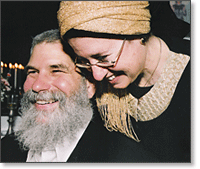(an excerpt from Orchard of Delights)
Cheshvan is the only Hebrew month
containing no holiday, commemorative event, or fast day. Following the month of
Tishrei, which has the major holidays of Rosh Hashanah, Yom Kippur,
Sukkot, and Shemini Atzeret, this lack is particularly noticeable. For this
reason some call it ‘Mar Cheshvan’ (Bitter Heshvan). Yet,
tradition teaches that in Messianic times, Heshvan will be “rewarded,” for the Third Temple
Rabbi
Shlomo Carlebach teaches that this month’s enormous spiritual potential is
created by the nature of our Heshvan prayers: prayers that reflect how we pray
when it seems as if our task has been completed, the verdict for the year
finalized. During Tishrei, when we are surrounded by the holiness of all the
holidays, it is easy to find the incentive and inspiration to pray. But what
happens when the holidays are over and we return to our ordinary routines? If
we fall back into our old ways as well, then the prayers and spiritual service
of Tishrei failed to touch us deeply enough. If we can actually bring to
fruition those changes we strived for and keep praying with the same commitment
and intensity, then we have the ability to transform a potentially bitter month
into an exalted one.
The
importance of not letting go of the achievements we have attained in Tishrei is
also reflected in the portion of Va’eira, which always occurs in the
middle of Cheshvan. In this portion, the first recorded prayer in the Torah
takes place as Abraham prays to save the wicked people of Sodom
Indeed,
even though God sent angels to save Lot before Abraham prayed, it was Abraham’s
prayers that saved the spark of Mashiach within Lot .
For Abraham wanted to believe that nothing was beyond redemption, nothing was
so broken that it could not be repaired, even the evil Sodom
